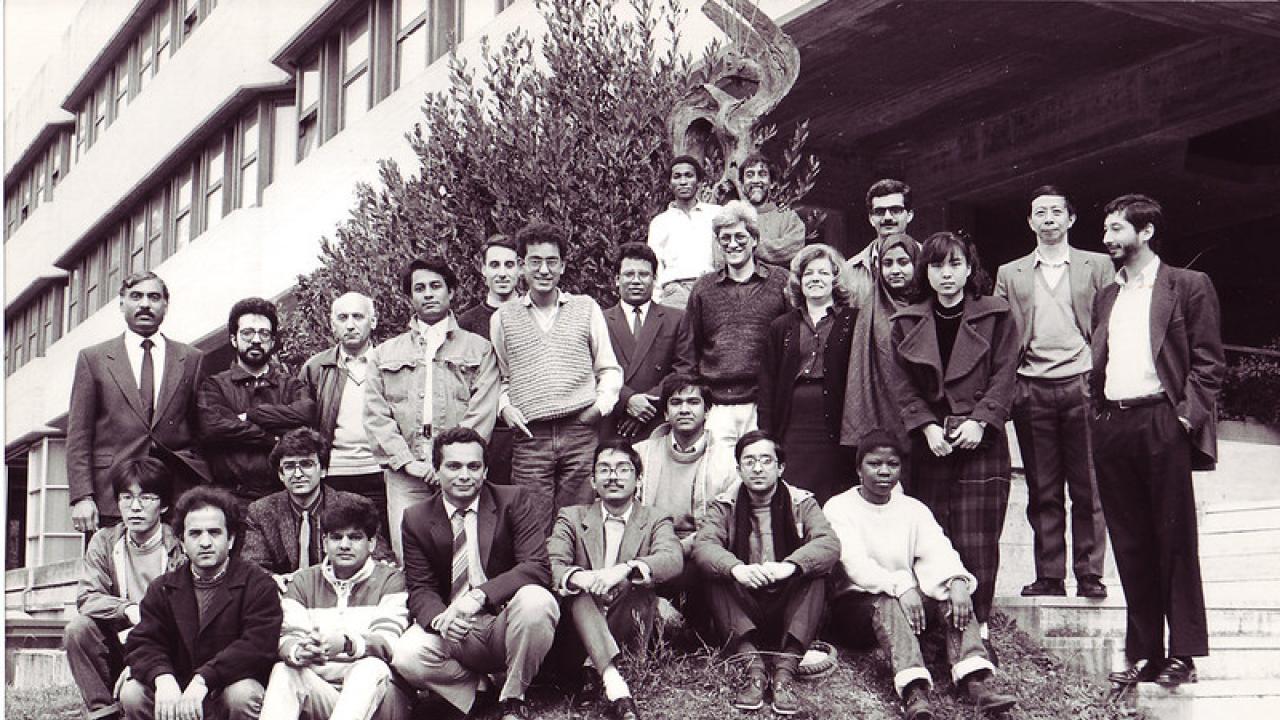
A programme to prepare bright young scientists from developing countries for advanced study in physics and math: this was one of ICTP founder Abdus Salam's fondest dreams. The first batch of students who arrived in 1991, the year the ICTP Postgraduate Diploma Programme started, knew they wanted to be scientists, and knew they wanted the best preparation possible, but they didn't know much about the new ICTP programme itself.
Hae-Young Kee was part of that first class that arrived in Trieste in the fall of 1991. "It took me a while to appreciate the programme because it was so intense," she remembers. "We were studying constantly for three months, and the amount that we had studied in those months was almost equivalent to one year's course work. I was pretty good at it, but I had to work extremely hard — sometimes we worked together day and night to complete a homework series, kind of scratching our heads," laughs Kee. "After that first three-month period ended, we were amazed at how much we had learned."
Thirty years later, Kee is the Canada Research Chair in Theory of Quantum Materials at the University of Toronto, in Toronto, Canada, with a thriving lab focusing on strongly correlated systems, quantum materials, high temperature superconductivity, and topological phases. Now with a thriving lab and research career, Kee cites the ICTP Postgraduate Diploma Programme as one of the turning points in her career.
In 1991, Jongbae Hong, Kee's advisor in Republic of Korea, recommended she study abroad. He was visiting ICTP regularly and had heard about the new Diploma Programme. "He was switching his field of research, from statistical physics to strongly correlated systems, but there were only a few experts in South Korea in that field at the time. He came to ICTP as a place where he could learn and expand into a new area of research." He knew and respected ICTP and recommended it to Kee, and she applied.
After two intense rounds of courses, the third facet of the Diploma programme helped shift Kee's career trajectory again. "I did my thesis with Patrik Fazekas, who later wrote a textbook “Lecture notes on Electron Correlation and Magnetism” based on a series of lectures he gave us. He was an amazing supervisor, along with my PhD supervisor. Patrik is the one who changed my career," says Kee. "At some point, I wasn't sure I wanted to stay in physics." But Kee started a project and collaboration with Fazekas that was very successful. "We started projects by asking questions like how we extend this, why it happens, how we can tell if it happens, etc. He pushed me to think and act beyond my comfort zone, and I enjoyed the countless discussions and debates that we had, which I felt would never end," says Kee, and she returned to ICTP for several subsequent summers to work and publish. "I got to learn that I enjoy the research process," says Kee.
"I was meeting lots of people in the summers," remembers Kee. "Back then ICTP was one of the key hubs for people in our field, there weren't many conferences in our field at the time, so I was talking with renowned researchers about what I did. Looking back, such interactions were priceless. I not only learned physics through those meetings, but also drastically improved my communication skills in English."
A few career steps later, Kee is still paying attention to building scientific capacity in her home country as well as developing her career, dual aims that line up with Salam's and ICTP's goals. "The internet is so well developed now, you can have a lot of impact in your home country without physically being there," says Kee. "When I was studying strongly correlated systems, very few people were working in the field in South Korea." Kee's lab in Toronto has been a welcoming training ground for a few postdoctoral fellows who are now faculty in Kee's native country. "The field has grown there," says Kee. "I think there are huge opportunities to contribute to science in your home country — being there physically is huge but there are many other ways to do it."
Thinking back fondly to the year and the place that changed her career, Kee laughs at the memories of her first day at ICTP. "It was my first trip outside the country, it was my first time living away from my parents, I didn't speak Italian, I almost missed my connection flight, and my luggage didn’t arrive," she remembers. In other words, a rough start. "I'm sure I seemed very tense and alert, very nervous and worried," she remembers. But those worries were met with a kind, prepared community: "People at ICTP were nice and kind to us," Kee smiles.
"In high school, I thought that physics was the most challenging subject, so in some sense I wanted to challenge myself — I want to do physics because this is a tough field. ICTP taught me that not only can I challenge myself, I'm also enjoying it a lot," says Kee. "I highly value networks developed there, and appreciate ICTP and the great job it's doing."
---- Kelsey Calhoun
















